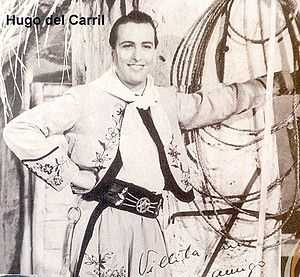Hugo del Carril
| Hugo del Carril | |
|---|---|
 | |
| Born |
Pierre Bruno Hugo Fontana 30 November 1912 Buenos Aires, Argentina |
| Died | 13 August 1989 (aged 76) |
Pierre Bruno Hugo Fontana otherwise known as Hugo del Carril (30 November 1912 – 13 August 1989 in Buenos Aires) was an Argentine film actor, film director and tango singer of the classic era.
Early life
Born in Buenos Aires, del Carril was the son of parents of a rich economic position, his mother Orsolina Bertani was born in Argentina (daughter of the Italian Anarchist Orsini Bertani), but his father, Hugo Fontana was an Italian architect, born in Milan. But in spite of the comforts and the comfortable life they led, his parents separated and young Hugo was left in the charge of a family friend.
Career
Del Carril originally began as a popular personality on Argentine radio, and parlayed that into a film career that began in late 1936. He was an immediate hit, and developed into one of Argentina's major film stars. He made some 50 film appearances as an actor between then and his retirement in 1976 but he turned to directing in 1949 and simultaneously directed, acted and produced many of his films becoming one of the industries highest earners of the period. In 1952 he directed the widely acclaimed Argentine film, Las Aguas Bajan Turbias known as "River of Blood" in English. He also composed the "Peronist March" (Marcha Peronista), which served as the anthem of the Peronist movement.
His 1961 film Esta tierra es mía was entered into the 2nd Moscow International Film Festival.[1]
Filmography
Actor

- El canto cuenta su historia (1976)
- La malavida (1973)
- Siempre fuimos compañeros (1973)
- Amalio Reyes, un hombre (1970)
- ¡Viva la vida! (1969)
- El día que me quieras (1969)
- Buenas noches, Buenos Aires (1964)
- La sentencia (1964)
- La calesita (1963)
- Esta tierra es mía (1961)
- Amorina (1961)
- Buenos días, Buenos Aires (corto - 1960)
- Culpable (1960)
- Las tierras blancas (1959)
- Más allá del olvido (1956)
- El último perro (1956)
- Vida nocturna (1955)
- Las aguas bajan turbias (1952)
- Surcos de sangre (1950)
- El último payador (1950)
- Historia del 900 (1949)
- Pobre mi madre querida (1948)
- Buenos Aires canta (1947)
- La cumparsita (1947)
- La cabalgata del circo (1945)
- Los dos rivales (1944)
- La piel de zapa (1943)
- Pasión imposible (1943)
- Amor último modelo (1942)
- La novela de un joven pobre (1942)
- Cuando canta el corazón (1941)
- En la luz de una estrella (1941)
- La canción de los barrios (1941)
- Confesión (1940)
- El astro del tango (1940)
- Gente bien (1939)
- La vida de Carlos Gardel (1939)
- La vida es un tango (1939)
- Madreselva (1938)
- Tres argentinos en París (1938)
- La vuelta de Rocha (1937)
- Los muchachos de antes no usaban gomina (1937)
Director
- Yo maté a Facundo (1975)
- Buenas noches, Buenos Aires (1964)
- La sentencia (1964)
- La calesita (1963)
- Esta tierra es mía (1961)
- Amorina (1961)
- Culpable (1960)
- Las tierras blancas (1959)
- Una cita con la vida (1958)
- Más allá del olvido (1956)
- La Quintrala, doña Catalina de los Ríos y Lisperguer (1955)
- Las aguas bajan turbias (1952)
- Surcos de sangre (1950)
- Historia del 900 (1949)
Screenwriter
- Yo maté a Facundo (1975)
- Historia del 900 (1949)
Producer
- Buenas noches, Buenos Aires (1964)
- La sentencia (1964)
- La calesita (1963)
- Las tierras blancas (1959)
- Una cita con la vida (1958)
- Más allá del olvido (1956)
- La Quintrala, doña Catalina de los Ríos y Lisperguer (1955)
- Surcos de sangre (1950)
- Historia del 900 (1949)
References
- ↑ "2nd Moscow International Film Festival (1961)". MIFF. Retrieved 2012-11-18.
External links
|